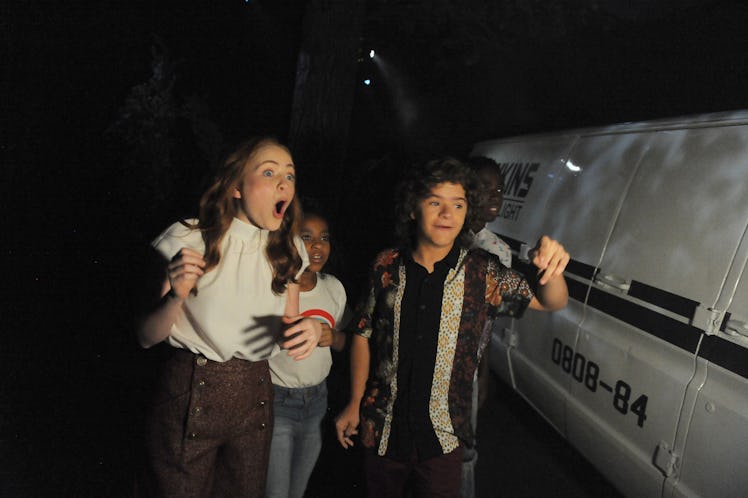
Experts Reveal What Walking Through A Haunted House REALLY Does To Your Brain
As far as your calendar’s concerned, Halloween takes up but one day a year — but you know better. Oct. 1 marks the first of 31 days of Halloween-inspired celebrations, from stocking up on candy to treat the treaters (and yourself), to dusting off your favorite horror films, reading scary stories, and walking through haunted houses. You might think actors dressing in cheap white sheets and jump scares end once you’ve made your way through the attraction, but what haunted houses really do to your brain is pretty mind-blowing. Being scared, in any capacity — be it a real fear or just for fun — triggers that same kind of fight-or-flight reaction in your body that typically stems from everyday stress. So even if you, like me, live for fright nights, you’re going to legitimately freak when you find out just what kind of tricks this seasonal treat is pulling on your brain, because it turns out, being afraid is more than just a thrill: it’s a physiological reaction.
Personally, it takes a really impressive, intelligently crafted horror film to genuinely scare me (I’m a movie snob, don’t @ me). But up until recently, I never really understood when my husband would say that a show or movie stressed him out. “It’s not real,” I’d tell him, being the Captain Obvious that I am, but he’d always explain that it didn’t matter whether or not what was taking place on screen was actually real, because it felt real in the moment. Haunted houses are the same in that way: You know for a fact the dirty man chasing you down the hallway with a chainsaw isn’t actually going to cut you up into pieces, and that the lurking, blood-spattered zombies are actually just very much alive people wrapped in toilet paper and covered in paint. Still, when you experience an overwhelming sense of fear — real or imaginary — your fight-or-flight mode is instantly activated, explains Robert Glatter, M.D., an assistant professor of emergency medicine at Lenox Hill Hospital, Northwell Health.
According to Glatter, the fear you might be faced with walking through a haunted house triggers the same stress response your body experiences when it’s confronted with danger or something unknown. If tiptoeing through dark corridors or hearing creeks among the shadows makes you jittery, and you’ve experienced physical reactions to the setting — like sweaty palms, dry mouth, and heavy breathing — it’s because adrenaline, aka a stress hormone, has been released in your body, says Glatter.
“In your brain, the fight-or-flight response triggers [the part of your brain that controls pain perception], which then alerts [the part of your brain that processes your emotions],” Glatter tells Elite Daily. In other words, once you start to respond to the fear of a haunted house emotionally, your body physically reacts by releasing adrenaline to send blood to your muscles so that you “get moving to avoid danger," Glatter explains. Now, of course, haunted houses are designed to scare you, with the intention of being a fun Halloween activity. You aren’t really in any danger stepping into a haunted house with a group of friends — but your brain can’t tell the difference between a fictionalized spook and real, evident danger. Therefore, it reacts the same way to both kinds of situations.
But how your brain responds to a fear of haunted houses can depend on a few details, psychologist Dr. Danielle Forshee, LLC tells Elite Daily. First, Forshee says, seeing as how fear itself is your brain’s automatic response to any threat, the closer that threat is to you (meaning how intensely you feel like you’re in danger), the more it will determine your brain's activity, she explains. What’s more, if you and your squad are hitting up haunted houses every weekend from the end of September through the first weekend of November, the constant release of stress hormones can cause long-term effects such as difficulty sleeping, anxiety, and even a weakened immune system, among other symptoms, according to The American Journal of Managed Care. In other words, the more you expose yourself to haunted houses, and trigger that stress response as a result, the more seriously your brain — and therefore, your body — will react to it.
So how, then, can you have your trick, but also treat your body right this Halloween season? Certainly not by skipping out on haunted houses, that’s for sure. You can still enjoy all the ghouls and goblins the holiday is known for; you just have to have a game plan for how to calm your body when you step inside a haunted house.
According to Dr. Belisa Vranich, director of breathing science at The Ash Center for Comprehensive Medicine, you can ease your nerves, and in turn, your brain, by practicing mindful breathing. “The trick to stay cool as everyone gasps around you is to keep your breathing low and steady,” Vranich tells Elite Daily over email. It's natural if you get scared for a second, and find yourself holding your breath, she says, but if you can catch yourself doing so, Vranich suggests resorting back to that steady, lower-body inhale and exhale. "Your brain will say, 'Hmm, that was pretty rad!' and your body will go, 'OK, next, let's move it along.'"
Bottom line: Haunted houses are meant to be spooky, but they're also meant to be a little silly, too. Gather up a group of friends, walk the so-called "haunted" halls, but do so with a grain of salt. Remember, it's all a bunch of hocus pocus.